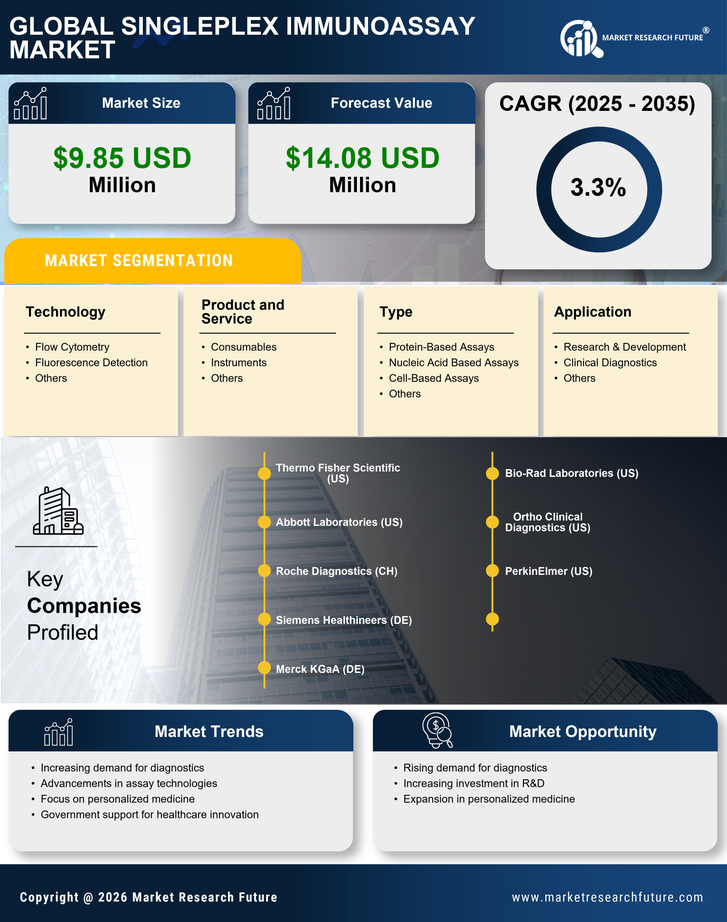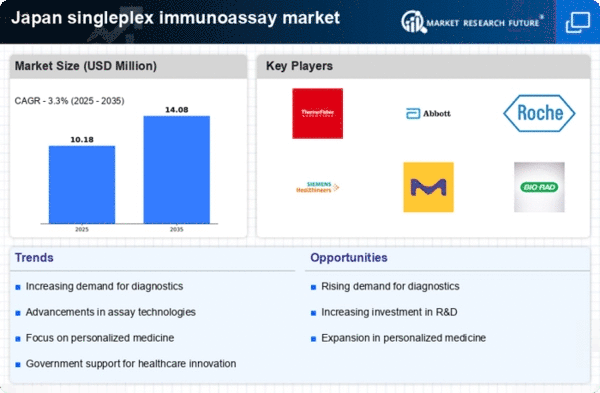Focus on Personalized Medicine
The growing emphasis on personalized medicine in Japan is influencing the singleplex immunoassay market. As healthcare providers aim to tailor treatments to individual patients, the need for specific biomarker detection becomes paramount. Singleplex immunoassays facilitate this by allowing for the precise measurement of targeted analytes, which is essential for developing personalized treatment plans. The market is likely to expand as pharmaceutical companies and research institutions increasingly rely on these assays for drug development and clinical trials. This trend may lead to a market valuation exceeding $600 million by 2030, as the demand for personalized healthcare solutions continues to rise.
Government Initiatives and Funding
Government initiatives aimed at enhancing healthcare infrastructure in Japan are positively impacting the singleplex immunoassay market. Increased funding for research and development in diagnostic technologies is fostering innovation and encouraging the adoption of advanced testing methods. The Japanese government has been actively promoting initiatives to improve disease detection and management, which aligns with the capabilities of singleplex immunoassays. This support is likely to stimulate market growth, as more laboratories and healthcare facilities invest in these technologies. The market could see a growth rate of around 7% annually, driven by these favorable policies and funding opportunities.
Rising Demand for Diagnostic Testing
The increasing prevalence of chronic diseases in Japan is driving the demand for diagnostic testing, particularly in the singleplex immunoassay market. As healthcare providers seek efficient and accurate testing methods, singleplex immunoassays offer a streamlined approach to detect specific biomarkers. The market is projected to grow at a CAGR of approximately 8% from 2025 to 2030, reflecting the urgent need for rapid diagnostics. Furthermore, the Japanese healthcare system emphasizes early detection and preventive care, which aligns with the capabilities of singleplex immunoassays. This trend is likely to enhance the adoption of these assays in clinical laboratories and hospitals, thereby expanding the market's reach and potential.
Technological Integration in Healthcare
The integration of advanced technologies in healthcare is significantly impacting the singleplex immunoassay market. Innovations such as automation, artificial intelligence, and data analytics are enhancing the efficiency and accuracy of immunoassays. In Japan, the adoption of automated systems in laboratories is increasing, which reduces human error and improves throughput. This technological shift is expected to boost the market, as laboratories can process a higher volume of tests with greater precision. Additionally, the incorporation of AI in data interpretation may lead to more reliable results, further driving the demand for singleplex immunoassays. The market is anticipated to benefit from these advancements, potentially increasing its value to over $500 million by 2030.
Growing Awareness of Preventive Healthcare
There is a notable increase in awareness regarding preventive healthcare among the Japanese population, which is influencing the singleplex immunoassay market. As individuals become more proactive about their health, the demand for early diagnostic tools is rising. Singleplex immunoassays provide a convenient and efficient means of screening for various conditions, making them appealing to both healthcare providers and patients. This trend is likely to result in a market growth trajectory that could reach $400 million by 2030, as more people seek out these tests for routine health assessments. The focus on preventive care is expected to further solidify the role of singleplex immunoassays in the healthcare landscape.
















